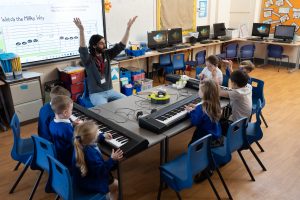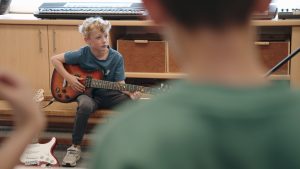Why group music making deserves a place at the heart of every school’s Pupil Premium strategy
Across the UK, thousands of children begin school already at a disadvantage. For many, challenges linked to poverty, limited enrichment opportunities, or low confidence can quickly widen the gap between potential and achievement. Schools work tirelessly to narrow that gap, yet the most powerful interventions are often those that reach beyond academics. The ones that build the skills and confidence to thrive in life, not just in tests.
We believe music is one of those interventions.
Music has always been a unifying force. But when taught well, and especially when experienced through group performance, it becomes something even greater: a leveller. It allows every child, regardless of background, to experience success, belonging, and joy. Research shows that regular group music making strengthens empathy, teamwork, and communication, all of which support wider learning and wellbeing. A landmark University of Cambridge study found that primary-aged pupils who made music together showed significantly higher levels of empathy and cooperation than peers who did not.
These are not abstract qualities. They are the “soft skills” employers and educators now recognise as essential for future success: the ability to collaborate, listen, lead, and adapt. As SoMi’s white paper The Indispensable Role of Soft Skills in the Future of Education highlights, these skills are becoming as vital to children’s futures as literacy and numeracy. Yet opportunities to develop them are often unevenly distributed.
That is where the equity challenge lies.
In many communities, access to music education still depends on what families can afford. Private lessons, youth orchestras, and extracurricular activities are often beyond reach for disadvantaged pupils. Meanwhile, schools in more affluent areas are able to offer richer experiences that build confidence, creativity, and social capital. Without intentional action, this “skills gap” reinforces social inequality long before pupils even reach secondary school.
High-quality group music provision can help close that gap, and schools already have a mechanism to make it happen.

Making the case for Pupil Premium funding
The Department for Education’s guidance on the use of Pupil Premium encourages schools to invest in evidence-based strategies that build both academic and wider life outcomes. The Education Endowment Foundation includes “arts participation” and “social and emotional learning” among its recommended approaches for disadvantaged pupils. Group music sits at the intersection of both.
When children learn and perform music together, they experience teamwork, perseverance, and shared achievement in a way few other activities can match. Confidence grows visibly. A quiet pupil might lead a warm-up, or a shy drummer might find their rhythm alongside classmates. Those small moments of success ripple through the rest of school life with better attendance, higher engagement, and stronger peer relationships.
Music can also support mental health and emotional regulation. The National Plan for Music Education calls it “a vital part of a broad and balanced curriculum” and highlights its power to “change lives.” For many pupils, particularly those facing disadvantage, music becomes a place of belonging and self-expression. It offers a rare safe space where effort, not circumstance, determines success.

A practical route to inclusion
Allocating a portion of Pupil Premium funding to structured group music provision is both legitimate and impactful. It meets all three pillars of the DfE and EEF’s framework:
-
High-quality teaching – delivered by skilled practitioners, often in partnership with classroom teachers.
-
Targeted support – focusing on confidence, communication, and resilience for pupils who need it most.
-
Wider enrichment – opening access to creative experiences that build cultural capital.
When music is embedded within the school week, not left as an optional afterthought, it sends a powerful message that creativity and collaboration matter. It also removes financial barriers, ensuring every child, not just those whose parents can pay, can take part.
We see daily how transformative this can be. The child who barely speaks in class beams with pride when performing. The group that once struggled to cooperate learns to listen and lead. These moments are not “extras.” They are the foundations of character, confidence, and connection that every child deserves.
Harmony through equity
If we truly want to level the playing field, we must recognise that opportunity is as important as instruction. Music offers both. It nurtures the skills that exams cannot measure and gives children from every background a stage on which to shine.
Through thoughtful use of Pupil Premium, schools can harness the power of music to foster inclusion, resilience, and belonging. When children make music together, they do not just learn notes. They learn to listen, to empathise, to believe in themselves and in each other.
And that is how real progress sounds.
🎸 Learn more about how SoMi can support pupil premium strategy at your school
